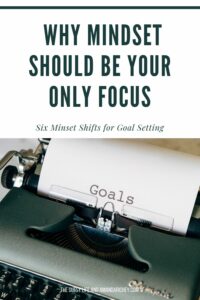Why Mindset in Goal Setting is the ONLY Thing You Need to Focus On
Does this time of year bring up a lot of stress and fear for you? Are you feeling uncertain and even doubtful of yourself and your ability to set and achieve goals because your track record feels less than stellar? Are you feeling like you don’t want to miss the mark and feel bad about yourself again after setting and then inevitably quitting your New Year’s resolutions? You are not alone! Goal setting can be difficult and bring up so many negative emotions for people (Myself included). You are not wrong. You are not bad at goal setting. You just need a mindset shift, we all do!
Six Mindset Shifts That Will Transform Your Goal Setting
1. Change the Wording
Make the pursuit and definition of the goal itself something that feels abundant and positive, not negative and fear based. Don’t make it about avoidance. Don’t make the goal about “I should…” Make it about possibility: “Let’s see what could happen if…” A great example of this: “I hate feeling out of shape, I should workout more so I won’t feel out of shape.” See the implicit negativity in that phrasing? See how you are set up to fail if your WHY is simply “not wanting to feel out of shape”? You most certainly will feel out of shape, probably the whole time you are working on your goal to exercise more, because that is what exercising more entails, exercise! Your thought “I don’t want to feel out of shape so I should exercise more” is going to lead your brain to want to quit the moment you feel discomfort because your whole goal was to NOT feel discomfort. You’ll feel like you’ve failed every second you’re uncomfortable. Instead, a phrase like “I want to engage in more healthy activity for my body on a regular basis” is both more neutral and empowering. Try out the thought “I’m working hard and making my body healthy” when you’re exercising and it’s hard, because let’s face it, it’s going to be hard! That’s the whole point.2. Expect the Pain and Discomfort
You can’t hate the journey and expect to love the outcome. The thoughts you have along the way will be the same thoughts you have when -if- you achieve the goal because your thoughts create your feelings, not external circumstances. You can’t tell yourself you hate exercise and expect yourself to stick with an exercise plan. Likewise, you can’t tell yourself it is hard and miserable to make money and expect to make a bunch of money and feel great about it.3. Shift Your Perspective
Rather than viewing your past goalsetting endeavors as failures, frame them as learning experiences. For me that means telling myself I didn’t fail, I just quit too soon. When working towards your goal, look at obstacles as hurdles to conquer, rather than reasons to quit. Reframe the narrative that goal achievement should feel good. The pain is the goal – that’s where growth happens! It should hurt. Embrace the hurt. Be excited when things get hard; it’s a valuable opportunity to create new thoughts to work on.“It’s supposed to be hard. If it wasn’t hard, everyone would do it. It’s the hard that makes it great.” – Jimmy Dugan (Tom Hanks), A League Of Their Own
4. Don’t Engage in Perfectionist Fantasies
Don’t make the goal the thing that will enable you to think and feel better about yourself once it is accomplished. The thoughts you have now are the same thoughts you’ll have when you accomplish the goal. Get really clear about your thoughts and feelings behind the goal setting, and then shift those thoughts to be more empowering (like the previous examples). We often expect the goal to deliver something to us, some sort of feeling or thought, but only your thoughts will lead to good feelings. No particular circumstance or outcome can do that for you.5. Just Do One Thing
Become the person that just does one thing, then add from there. Use the slight edge. Don’t engage in perfectionist or black-and-white, all-or-nothing thinking. Just do something. The difference between the person who sets a goal and sticks with it 100% of the time and the person who only sticks with it 20% of the time is small. The first step is the biggest one. Just keep going. It won’t be perfect, it will feel uncomfortable, but that’s the point. Just keep going.6. It’s Not About the Goal, It’s About the Person You Become
It’s not about the goal itself, but who you have to become in order to attain it. The point of the goal is not the action – doing the exercise three times a week or making $5000 a month – the point of the goal is to be a person who makes doing regular exercise a habit. Or the person who continues to take steps to make money in their business. It’s not the actual content of the goal that matters, it is who you have to become to create the result for yourself that matters. You actually have to create the identity of someone who consistently takes the action required to reach a goal. With this mindset you will focus more on taking some sort of action, whether it’s the exact thing you set out to do or something else.
Conclusion
Look at some of the areas in your life where you HAVE succeeded, and then look at areas that you feel you missed the mark. Chances are the difference is what you made the goals mean about who you are or who you SHOULD be. When you set goals and they inevitably get uncomfortable and difficult, do you make it mean something about you? Chances are those goals were based on the idea that you should inherently know how to be that person; that you were currently lacking, in need of fixing or changing because you were somehow wrong. Whereas, the goals you accomplished were probably about understanding that you were going to become a completely new person, and that was the point. I want you to think about this: What could you accomplish if you could learn to work on your mindset first? If you really want to set and achieve your New Year’s resolutions this year, you are going to have to work on your mindset and you are going to need some accountability help! and guess what?I help Gutsy women just like you achieve their goals with confidence and ease in as little as 3 months!
So why not hop on a call with me and figure out once and for all what is causing you to fall short on your goals and what to do about it?




Your article gave me a lot of inspiration, I hope you can explain your point of view in more detail, because I have some doubts, thank you.
Thank you very much for sharing, I learned a lot from your article. Very cool. Thanks. nimabi